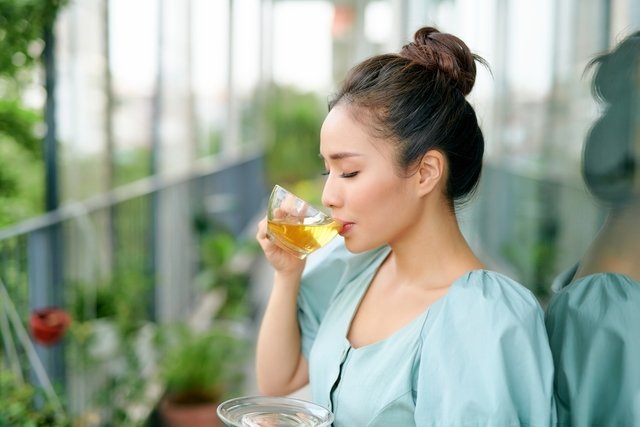The use of teas is a good way to complement the treatment of urinary infections, as they can increase the effect of prescribed medications, as well as alleviate symptoms more quickly.
However, teas should never replace doctor’s advice, especially when antibiotics are being used.
The teas most used in cases of urinary tract infections include those with antimicrobial action, as they help to eliminate the microorganisms that are causing the infection, as well as diuretics, which increase the amount of urine produced, allowing the urinary tract to be cleaned. Some good proven examples are:

8 teas for urinary tract infections
The main teas for urinary tract infections are:
1. Bearberry tea
The leaves of this plant have been used for many years to alleviate and treat the symptoms of urinary tract infections and, according to several studies, its effects are related to the presence of a substance, known as arbutin, which has a strong antimicrobial action and, therefore, manages to eliminate the bacteria responsible for urinary infections.
In addition, ursina herb also has a diuretic action, which helps to eliminate more urine during the day, keeping the urinary tract cleaner and free of microorganisms.
Ingredients
- 3 g of dried bearberry leaves;
- 200 mL of cold water.
Preparation mode
Add the leaves with water and let it rest for 12 to 14 hours, in a covered container, protected from light. Then, strain the mixture and drink warm up to 4 cups a day. The ingredients presented are generally used to prepare a cup of tea, so, if desired, the quantities should be increased to make enough for 1 day.
Bearberry can cause some cases of poisoning and, therefore, should be consumed in moderation, and it is recommended to carry out the treatment only during symptom attacks and for a maximum of 7 days. If symptoms such as nausea or vomiting appear, it is important to stop taking bearberry.
Furthermore, this tea should not be used by pregnant or breastfeeding women, children under 12 years of age and people with stomach problems such as gastritis or ulcers, for example.
2. Hydraste tea
Hydraste is another plant with scientific evidence that can help treat cases of urinary tract infections, as it is rich in substances such as hydrastin and berberine, which have antimicrobial and anti-inflammatory effects.
Furthermore, some studies also indicate that berberine can even prevent some bacteria, especially E. colican stick to the walls of the urinary system, being more easily eliminated.
Ingredients
- 1 teaspoon of hydraste root powder;
- 250 mL of boiling water.
Preparation mode
Place the ingredients in a cup for 10 to 15 minutes and stir. Then strain, let it cool and consume 2 to 3 times a day.
Hydraste powder for making tea can be difficult to find and, therefore, this plant can also be used in the form of a liquid root extract, taking ¼ teaspoon per day, or according to the instructions on the packaging. Another form of consumption is the use of capsules, and in these cases, it is recommended to consume 450 mg 2 to 3 times a day.
Hydraste tea should not be consumed by pregnant or lactating women, or by people with high blood pressure.
3. Corn Hair Tea
Corn hair tea is another home remedy widely used to treat urinary system problems, including urinary tract infections. After some studies, it was found that this tea has good concentrations of tannins, terpenoids and alkaloids, which give it good antimicrobial properties.
In addition, corn hair tea is also a diuretic, which facilitates the elimination of microorganisms from the urinary system.
Ingredients
Preparation mode
Place the corn hair together with the water in a cup and wait 5 to 10 minutes. Then strain, let cool and drink 2 to 3 times a day.
Corn hair tea should not be used by pregnant or breastfeeding women, men with prostate inflammation, or by people taking medications to lower blood pressure, anticoagulants, diuretics and diabetes.
4. Dandelion tea
The dandelion is a medicinal plant of the species Taraxacum officinale with excellent diuretic action that helps to increase the amount of urine, allowing the bacteria that are causing the urinary infection to be eliminated more quickly.
Ingredients
- 15 g of dandelion leaves and roots;
- 250 mL of boiling water.
Preparation mode
Add the dandelion with the boiling water and let it rest for 5 to 10 minutes. Then strain and drink 2 to 3 times a day.
Dandelion tea should not be used by pregnant or breastfeeding women.
5. Tripe tea
Tripe leaves have diuretic and antimicrobial activity that appear to help fight microorganisms that cause urinary tract infections, in addition to increasing the amount of urine.
The properties of the medicinal plant, the species Buxus sempervirens, were attributed to its essential oil, which is mainly produced in the leaves. This is because the oil is able to be absorbed in the stomach and is then released into the kidneys, where it joins with the urine and promotes internal “cleansing” of the urinary tract.
Ingredients
- 1 to 2 teaspoons of dried tripe leaves;
- 1 cup of boiling water.
Preparation mode
Place the leaves in boiling water and let it rest for 5 to 10 minutes. Then strain, let it cool and drink 2 to 3 times a day.
Tripe tea should not be used by children under 12 years of age, pregnant or breastfeeding women, or by people who have epilepsy.
6. Horsetail tea
Horsetail tea made from the medicinal plant Equisetum arvense It is one of the best-known natural diuretics around the world and, for this reason, it can be a good ally in the treatment of urinary infections, as it facilitates the elimination of the microorganisms responsible for the infection.
According to the investigations carried out, this action of horsetail is related to the presence of an important diuretic substance, equisetonin.
Ingredients
- 1 tablespoon of mackerel;
- 1 cup of boiling water.
Preparation mode
Combine the ingredients in a cup and let it rest for 5 to 10 minutes. Then strain, let it cool and drink up to 3 cups a day.
Since it is a strong diuretic, which eliminates several types of important minerals, horsetail should not be used for more than 7 days.
Furthermore, horsetail tea should not be used by children under 12 years of age, pregnant or breastfeeding women, or by people who have heart failure, low blood pressure and kidney disease.
7. Sauce cha
Parsley, also known as parsley, in addition to being a strong natural diuretic, also helps with kidney health, allowing urine to be eliminated more quickly, which helps eliminate bacteria from the urinary tract, combating cystitis.
Ingredients
- 1 bunch or 15 grams of fresh parsley with stems;
- 250 mL of water.
Preparation mode
Cut the parsley into small pieces and add it to the cup of boiling water. Let it rest for 5 to 10 minutes. Strain, let cool and drink up to 3 times a day.
Parsley tea should not be used by pregnant women or people with kidney or heart failure.
8. Hibiscus tea
Hibiscus tea, made from the medicinal plant Hibiscus sabdariffais rich in flavonoids and anthocyanins, such as hibiscin, with antimicrobial properties, which help prevent bacteria from adhering E. coli e Klebsiella pneumoniae in the wall of the urinary system and bladder.
Furthermore, this tea also has diuretic properties that help eliminate these bacteria through urine, preventing the emergence of recurring infections.
Ingredients
- 1 tablespoon of dried hibiscus flowers;
- 400 mL of boiling water.
Preparation mode
Bring the water to a boil, turn off the heat, add the hibiscus flowers and let it rest for about 5 minutes. Then strain and drink warm at least 3 times a day.
Hibiscus tea should not be used by children under 12 years of age, pregnant or lactating women or those with kidney or liver disease. Furthermore, people with high blood pressure or diabetes who use medications to treat these conditions should not drink the tea.
Important precautions when using teas
The use of teas or any other natural product to treat health problems should always be advised by a doctor or health professional specialized in the use of medicinal plants. This is because dosages need to be well adapted to factors such as the person’s age, weight and health history.
Furthermore, pregnant women, breastfeeding women and children under 3 years of age should avoid using any type of tea without the knowledge of their obstetrician or pediatrician.
Since most of the teas recommended have a diuretic action, it is also very important that they are not used for very long periods, generally longer than 7 days, as this can result in an imbalance of important minerals in the body.
In addition to using teas, there are also some changes that can be made to your diet to ensure the success of the treatment. See more tips from our nutritionist:

Sign up for our newsletter and stay up to date with exclusive news
that can transform your routine!
Warning: Undefined array key "title" in /home/storelat/public_html/wp-content/plugins/link-whisper-premium/templates/frontend/related-posts.php on line 12
Warning: Undefined array key "title_tag" in /home/storelat/public_html/wp-content/plugins/link-whisper-premium/templates/frontend/related-posts.php on line 13



